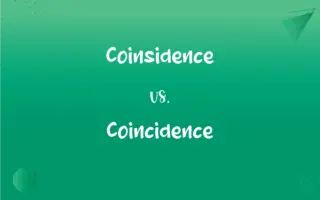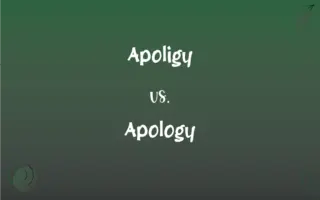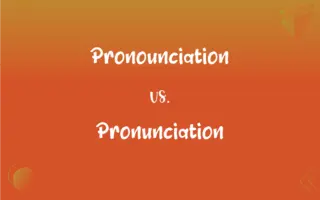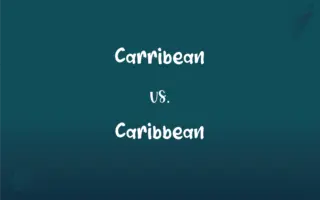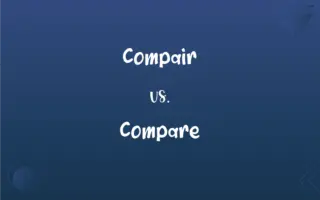Cacoon vs. Cocoon: Mastering the Correct Spelling
Edited by Aimie Carlson || By Janet White || Published on May 6, 2024
"Cacoon" is an incorrect spelling, while "cocoon" is correct, referring to a protective case spun by moth larvae. A cocoon shelters the insect during metamorphosis.

Which is correct: Cacoon or Cocoon
How to spell Cocoon?

Cacoon is Incorrect

Cocoon is Correct
ADVERTISEMENT
Key Differences
Recall "co-coon" has two "o's" standing together like a cocoon's protective layers.
Associate "cocoon" with "moon," both sharing the double "o" in their spelling.
Remember, "coco" as in coconut, then add "on" – both have a protective layer.
Think of "cocoon" starting with "co-" like "cooperate," implying working together to protect.
Visualize a caterpillar in its cocoon, emphasizing the double "o" in the middle.
ADVERTISEMENT
Correct usage of Cocoon
My brother believed a spider spins a cacoon.
My brother believed a spider spins a cocoon.
She wanted to see a moth come out of its cacoon.
She wanted to see a moth come out of its cocoon.
She waited for the butterfly to emerge from its cacoon.
She waited for the butterfly to emerge from its cocoon.
He thought the caterpillar wrapped itself in a cacoon.
He thought the caterpillar wrapped itself in a cocoon.
Cocoon Definitions
A silky case spun by larvae for protection during metamorphosis.
The caterpillar wrapped itself in a cocoon before transforming into a butterfly.
To retreat from the outside world.
On weekends, I like to cocoon at home with a good book.
To envelop or surround protectively.
She cocooned her newborn in a soft, warm blanket.
A protective covering or enclosure.
The artist's studio was a cocoon of creativity and solitude.
A place or state of secluded security.
He created a cocoon of blankets and pillows to read in.
A protective case of silk or similar fibrous material spun by the larvae of moths and certain other insects as a cover for the pupa.
A similar natural protective covering or structure, such as the egg case of a spider.
Cocoon Sentences
The process of emerging from the cocoon is called eclosion.
Inside the cocoon, the caterpillar transforms into a butterfly.
A silkworm cocoon is used to produce silk thread for fabric.
During the winter, some animals create a cocoon-like environment for hibernation.
Some people feel safe and secure when they're wrapped up in a blanket, like in a cocoon.
The concept of a cocoon can also describe a phase of personal growth and transformation.
A protective case similar to a cocoon is sometimes used to transport delicate items.
In nature, finding a cocoon attached to a leaf is a common sight.
A moth's cocoon is usually less silky than that of a silkworm.
The caterpillar spins a silk cocoon to protect itself during metamorphosis.
Artists often depict the stage of a butterfly's life in a cocoon as a symbol of change.
A cocoon can be found in various shapes and sizes, depending on the species.
The strength of a silk cocoon is remarkable considering its delicate appearance.
The beauty of a butterfly is often more appreciated knowing the transformation it underwent in its cocoon.
The butterfly spends about two weeks in its cocoon before it is ready to emerge.
Children are fascinated by the process of a caterpillar spinning a cocoon and turning into a butterfly.
The science class observed a cocoon in the classroom to learn about metamorphosis.
The process of making a cocoon is intricate and requires a lot of energy from the caterpillar.
After the transformation inside the cocoon is complete, the new butterfly must break free to survive.
Finding a cocoon in the garden can be an exciting discovery for a nature enthusiast.
Cocoon Idioms & Phrases
To cocoon oneself
To wrap oneself up in a blanket or warm clothing, seeking comfort or warmth.
On cold nights, she likes to cocoon herself in a soft blanket and read a book.
Break out of one's cocoon
To emerge from a period of isolation or inactivity with new ideas or enthusiasm.
After months of studying, she finally broke out of her cocoon, ready to start her new project.
Cocoon stage
A period of development where someone or something is not yet ready to be revealed.
The company's new product is still in the cocoon stage, and they're not releasing details yet.
In a cocoon
Being in a protective or isolated environment.
He's been in a cocoon since he started working from home, barely seeing anyone.
Wrap in a cocoon
To protect or isolate someone or something from the outside world.
They wrap the ancient artifacts in a cocoon of soft materials for protection.
Social cocoon
A close-knit group of friends or family providing a protective social environment.
After moving to a new city, she found a social cocoon in her book club.
Cocoon of comfort
A place or situation where one feels completely at ease and comfortable.
Her cozy living room has become a cocoon of comfort where she spends her weekends.
Transformational cocoon
A period or place of significant personal or organizational change.
The retreat served as a transformational cocoon, where he discovered his true passion.
Cocoon of privacy
A situation or environment where one feels safe from outside intrusion.
Celebrities often have to create a cocoon of privacy around their personal lives.
Cocoon of warmth
Feeling or providing a sense of warmth, physically or emotionally.
They welcomed him into their home, enveloping him in a cocoon of warmth and friendliness.
Break the cocoon
To leave a protective or restrictive environment, often to face the real world.
It's time for him to break the cocoon and face the challenges of independent life.
Emerge from the cocoon
To come out of a phase of development or isolation changed or renewed.
After years of hard work, he emerged from his cocoon, a successful writer.
Cocoon of isolation
Being completely cut off from social interactions or external influences.
After the incident, she lived in a cocoon of isolation, avoiding contact with her peers.
Cocoon of silence
A state or place where no sound is heard, offering tranquility or isolation.
Early in the morning, the library is a cocoon of silence, perfect for studying.
To spin a cocoon around
To build a protective barrier around oneself or something.
He spun a cocoon around his emotions, not letting anyone see his true feelings.
Cocoon of secrecy
A situation in which information is tightly controlled and kept away from outsiders.
The government project was wrapped in a cocoon of secrecy until its completion.
Cocoon of safety
An environment where one feels secure and protected from harm.
The new security system provided a cocoon of safety for the homeowners.
Cocoon of tranquility
A peaceful and calm environment, away from stress or disturbance.
The meditation center is designed to be a cocoon of tranquility, helping visitors find inner peace.
To weave a cocoon
To create a protective or comforting environment or situation.
With every story she told, she wove a cocoon of imagination for the children.
FAQs
What is the root word of cocoon?
The root word is the French "cocon," meaning a shell or protective covering.
Which vowel is used before cocoon?
There is no vowel directly before "cocoon" as it starts with "c."
What is the pronunciation of cocoon?
Cocoon is pronounced as /kəˈkuːn/.
Which preposition is used with cocoon?
"In" or "into" are prepositions used with "cocoon" (e.g., in a cocoon, transform into a cocoon).
Why is it called cocoon?
Derived from the French "cocon," it refers to the protective casing made by larvae.
What is the verb form of cocoon?
The verb form is "cocoon."
What is the singular form of cocoon?
The singular form is "cocoon."
Is cocoon a negative or positive word?
"Cocoon" is neutral; its connotation depends on the context.
Is cocoon a collective noun?
No, "cocoon" is not a collective noun.
Is the cocoon term a metaphor?
"Cocoon" can be used metaphorically to describe a protective or isolating environment.
What is the plural form of cocoon?
The plural form is "cocoons."
Is cocoon an abstract noun?
No, "cocoon" is a concrete noun, referring to a physical object.
Is the word cocoon imperative?
"Cocoon" can be used in imperative form as a verb (e.g., "Cocoon yourself in blankets").
What is a stressed syllable in cocoon?
The second syllable, "coon," is stressed.
What is the opposite of cocoon?
The opposite of cocoon (verb) could be "expose" or "unveil," since to cocoon something is to cover it protectively, whereas these verbs imply removing cover or protection. For cocoon (noun), an opposite concept might be more context-dependent, but it could involve exposure or emergence, reflecting the transition from a protected to an unprotected or revealed state.
Which conjunction is used with cocoon?
Conjunctions such as "and" or "or" can be used, depending on the sentence structure.
Which article is used with cocoon?
The articles "a," "an," or "the" can be used with "cocoon."
Is cocoon an adverb?
No, "cocoon" is not an adverb.
Is cocoon a vowel or consonant?
The word "cocoon" starts with a consonant.
How many syllables are in cocoon?
There are two syllables in "cocoon."
How do we divide cocoon into syllables?
Co-coon.
Is cocoon a noun or adjective?
"Cocoon" is primarily a noun, but it can be used as a verb.
What part of speech is cocoon?
Cocoon is primarily used as a noun. It refers to the protective casing spun by moth caterpillars and some other insects in which they transform into their mature form. Cocoon can also be used as a verb, meaning to envelop or surround in a protective or comforting way.
What is another term for cocoon?
Another term for cocoon, especially in a metaphorical sense, could be "shroud" or "envelope." In the context of biology, specifically relating to the structure made by caterpillars, "chrysalis" is a term used for the pupal stage of butterflies, which is similar but not identical to a cocoon.
Which determiner is used with cocoon?
Determiners such as "a," "an," "the," "this," "that," "my," "your," etc., can be used with "cocoon," depending on the context of the sentence.
Is cocoon a countable noun?
Yes, "cocoon" is a countable noun.
What is the third form of cocoon?
The third form of "cocoon," which is the past participle when used as a verb, is also "cocooned."
How is cocoon used in a sentence?
As a noun: "The caterpillar spun a cocoon and began the process of metamorphosis into a butterfly."
What is the first form of cocoon?
The first form of "cocoon," when considering it as a verb, is "cocoon," which is the base form or the present tense.
What is the second form of cocoon?
The second form of "cocoon," or its past tense when used as a verb, is "cocooned."
About Author
Written by
Janet WhiteJanet White has been an esteemed writer and blogger for Difference Wiki. Holding a Master's degree in Science and Medical Journalism from the prestigious Boston University, she has consistently demonstrated her expertise and passion for her field. When she's not immersed in her work, Janet relishes her time exercising, delving into a good book, and cherishing moments with friends and family.
Edited by
Aimie CarlsonAimie Carlson, holding a master's degree in English literature, is a fervent English language enthusiast. She lends her writing talents to Difference Wiki, a prominent website that specializes in comparisons, offering readers insightful analyses that both captivate and inform.




















